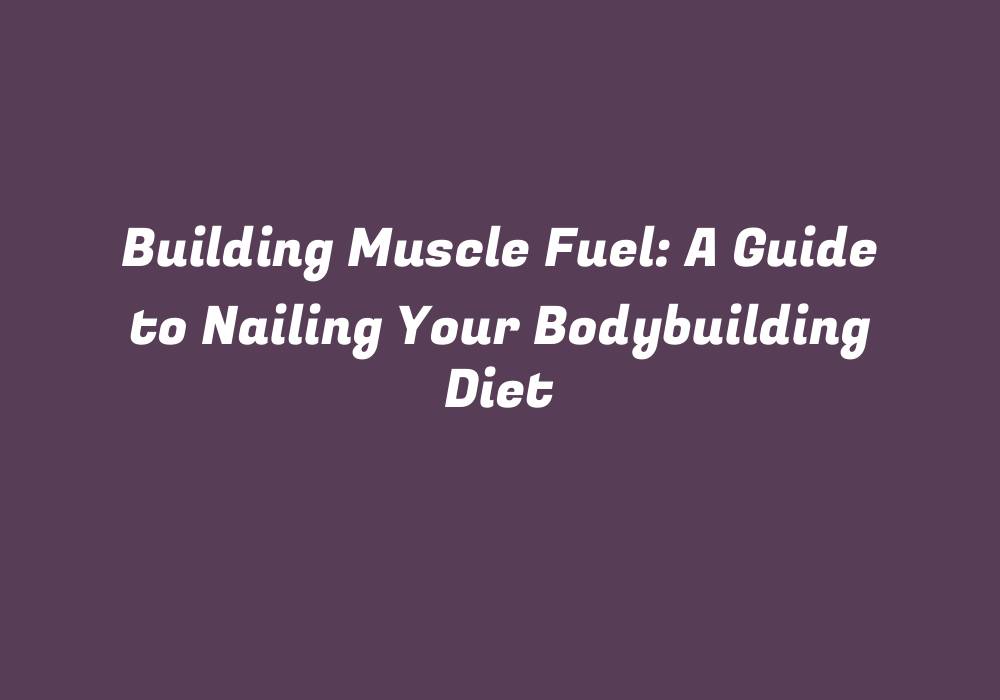Introduction to Bodybuilding Diets for Muscle Building
To build and maintain lean muscle mass, proper nutrition is crucial. This guide aims to provide you with essential information on creating an effective diet plan for bodybuilding. The right fuel will help in gaining strength, improving performance, and achieving the desired physique. Follow these tips while crafting your bodybuilding diet.
Carbohydrates: Fueling Your Workouts
Carbohydrates serve as a primary energy source during your workouts. They are classified into complex carbohydrates, such as whole grains, fruits, and vegetables, which provide sustained energy. Simple carbohydrates, like candy or soda, should be avoided due to their short-lived energy boosts that can lead to sugar crashes. Aim for a 45% to 65% carbohydrate intake in your daily diet based on your body type and workout intensity.
Protein: Building Muscle Fiber
Proteins are essential for building, repairing, and maintaining muscles. Consuming adequate protein is crucial for the recovery process after a tough workout. Aim to consume at least 1 gram of protein per pound of body weight daily, or approximately 20% to 35% of your total caloric intake. Focus on consuming high-quality proteins, such as lean meats, poultry, fish, dairy products, and legumes.
Healthy Fats: Essential for Muscle Growth
Fats play a crucial role in muscle growth by assisting with the absorption of vitamins like A, D, E, and K, improving testosterone production, and promoting satiety. Include healthy fats such as nuts, seeds, fatty fish, olive oil, avocados, and grass-fed butter in your daily meal plans. Make sure to keep your total fat intake between 20% and 35% of your daily calories.
Vitamins and Minerals: Essential Micronutrients for Muscle Growth
Nutrient-dense foods like fruits, vegetables, whole grains, and dairy products are essential in providing vitamins and minerals required for optimal muscle function. These micronutrients help with energy production, maintaining muscle mass, and reducing inflammation. Make sure to include a variety of nutrient-rich foods to cover your daily requirements.
Water: The Foundation of a Healthy Body
Staying hydrated is crucial for optimal muscle function, as it assists in transporting nutrients to muscles, regulating body temperature, and preventing fatigue during workouts. Aim to consume approximately half an ounce of water per pound of body weight daily, or about eight glasses of water for the average person.
Meal Timing: Optimizing Muscle Gains
Fueling your body at strategic times can optimize muscle growth and recovery. Eat a pre-workout meal that includes complex carbohydrates, lean protein, and healthy fats to provide sustained energy during your workout. Post-workout meals should be high in carbohydrates and proteins, helping with muscle repair and replenishing glycogen stores.
Meal Frequency: Ensuring Proper Nutrient Intake
Aim to consume small meals or snacks every few hours throughout the day rather than consuming large meals sporadically. This method of eating helps in maintaining stable blood sugar levels and consistent energy flow, preventing fatigue and promoting muscle growth.
Food Combining: Maximizing Nutrient Absorption
Combine protein-rich foods with carbohydrate-dense options to improve nutrient absorption. Pair proteins like fish or lean meats with complex carbs such as whole grains, fruits, or vegetables for an effective meal that will promote muscle growth and recovery.
Supplements: Boosting Your Bodybuilding Diet
While a well-balanced diet should provide most of your nutritional needs, certain supplements can enhance your bodybuilding efforts. Some popular options include protein powders, creatine, branched-chain amino acids (BCAAs), and omega-3 fatty acids. Consult with a registered dietitian or sports nutritionist before adding any supplement to your routine.
Conclusion: Tailoring Your Bodybuilding Diet for Optimal Muscle Growth
To successfully build muscle, focus on consuming a balanced diet rich in lean proteins, complex carbohydrates, healthy fats, vitamins and minerals, and staying hydrated. Pay attention to meal timing, frequency, food combining, and consider incorporating supplements into your routine if necessary. With proper nutrition and dedication, you will achieve the muscular physique desired for bodybuilding success. Remember, consistency is key when crafting a well-rounded diet plan that supports your fitness goals.
